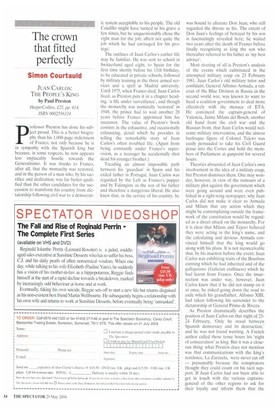The crown that fitted perfectly
Simon Courtauld
JUAN CARLOS:
THE PEOPLE'S KING
by Paul Preston HarperCollins, £25, pp. 614. ISBN 0002556324
professor Preston has done his subject proud. This is a better biography than his 1,000-page indictment of Franco, not only because he is in sympathy with the Spanish king but because, in some respects, he now appears less implacably hostile towards the Generalisimo. It was thanks to Franco, after all, that the monarchy was restored, and in the person of a man who, by his sacrifice and dedication, was far better qualified than the other candidates for the succession to transform his country from dictatorship following civil war to a democrat ic system acceptable to his people. The old Caudillo might have turned in his grave a few times, but he unquestionably chose the right man for the job, albeit not quite the job which he had envisaged for his protégé. The outlines of Juan Carlos's earlier life may be familiar. He was sent to school in Switzerland aged eight, to Spain for the first time shortly before his 11th birthday, to be educated at private schools, followed by military training in the three armed services and a spell at Madrid university. Until 1975, when Franco died, Juan Carlos lived, as Preston puts it in a chapter heading, 'a life under surveillance', and though the monarchy was nominally 'restored' in 1948, the prince had to wait another 20 years before Franco appointed him his successor. The value of Preston's book consists in the exhaustive, and occasionally exhausting, detail which he provides in telling the remarkable story of Juan Carlos's often troubled life, (Apart from being constantly under Franco's supervision, as a teenager he accidentally shot dead his younger brother.)
Treading an almost impossible path between his 'guardian' in Spain and his exiled father in Portugal, Juan Carlos was regarded by the Left as Franco's puppet and by Falangists as the son of his father and therefore a dangerous liberal. He also knew that, in the service of his country. he
was bound to alienate Don Juan, who still regarded the throne as his. The extent of Don Juan's feelings of betrayal by his son is fascinatingly revealed here; he waited two years after the death of Franco before finally recognising as king the son who thereafter referred to his father as 'my best adviser'.
Most riveting of all is Preston's analysis of the events which culminated in the attempted military coup on 23 February 1981. Juan Carlos's old military tutor and confidant, General Alfonso Armada, a veteran of the Blue Division in Russia in the second world war, was known to want to head a coalition government to deal more effectively with the menace of ETA. He convinced the captain-general of Valencia, Jaime Milans del Bosch, another old hand from the civil war and the Russian front, that Juan Carlos would welcome military intervention, and the almost burlesque figure of Colonel Tejero was easily persuaded to take his Civil Guard posse into the Cortes and hold the members of Parliament at gunpoint for several hours.
Theories abounded of Juan Carlos's own involvement in the idea of a military coup, but Preston dismisses them. One may wonder, however, in view of the rumours of a military plot against the government which were going around and were even published in a right-wing newspaper, why Juan Carlos did not make it clear to Armada and Milans that any action which they might be contemplating outside the framework of the constitution would be regarded as a direct attack on the monarchy. For it is clear that Milans and Tejero believed they were acting in the king's name, and the calculating and devious Armada convinced himself that the king would go along with his plans. It is not inconceivable that, by his inaction before the event, Juan Carlos was exhibiting traits of the Bourbon cunning which he had inherited and of the galleguismo (Galician craftiness) which he had learnt from Franco. Once the insurrection was under way, however, Juan Carlos knew that if he did not stamp on it at once, he risked going down the road to exile which his grandfather, Alfonso XIII, had taken following his surrender to the dictatorship of General Primo de Rivera. As Preston dramatically describes the position of Juan Carlos on that night of 2324 February, 'Only he stood between Spanish democracy and its destruction,' and he was not found wanting. A French author called those tense hours his 'night of consecration' as king. But it was a closerun thing: what Preston does not mention was that communications with the king's residence, La Zarzuela, were never cut off — presumably because the conspirators thought they could count on his tacit support. If Juan Carlos had not been able to get in touch with the various captainsgeneral of the other regions to ask for their loyalty and inform them that the
action being taken was against the will of their commander-in-chief, as he said later, 'I don't even like to imagine what might have happened'.
Other golpistas continued to plot against the state for the next four years, but by then hardly any of the military old guard remained on the active list, Spain was a member of Nato and a socialist government was well established, Juan Carlos was satisfied with his own popularity (in no way dented by his extramarital affairs) but concerned that the country was still not nionarquico. He was much moved and reassured, however, when thousands of people attended the funeral of his father in 1993. A decade on, the succession would seem to be assured by the marriage last weekend of Prince Felipe, who should be the first Spanish monarch for many generations to be born and to die in his own country.



































































 Previous page
Previous page